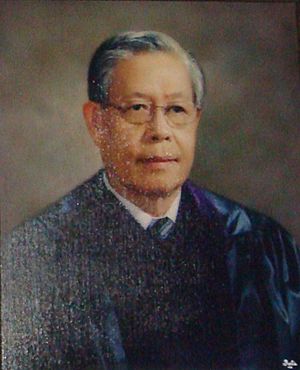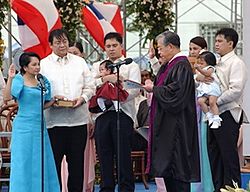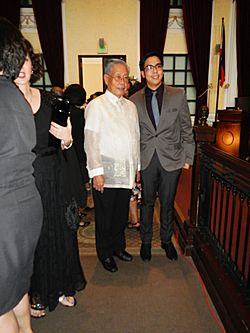Hilario Davide Jr. facts for kids
Quick facts for kids
Hilario Davide Jr.
|
|
|---|---|

Official portrait, taken c. 1998–2005
|
|
| 17th Permanent Representative of the Philippines to the United Nations | |
| In office February 24, 2007 – April 29, 2010 |
|
| Nominated by | Gloria Macapagal Arroyo |
| Preceded by | Lauro Baja, Jr. |
| Succeeded by | Libran N. Cabactulan |
| 20th Chief Justice of the Supreme Court of the Philippines | |
| In office November 30, 1998 – December 20, 2005 |
|
| Nominated by | Joseph Estrada |
| Preceded by | Andres R. Narvasa |
| Succeeded by | Artemio V. Panganiban |
| 124th Associate Justice of the Supreme Court of the Philippines | |
| In office January 24, 1991 – November 29, 1998 |
|
| Nominated by | Corazon Aquino |
| Preceded by | Irene R. Cortes |
| Succeeded by | Minerva Gonzaga-Reyes |
| Chairman of the Commission on Elections | |
| In office February 15, 1988 – January 12, 1990 |
|
| Appointed by | Corazon Aquino |
| Preceded by | Ramon H. Felipe |
| Succeeded by | Haydee Yorac |
| Member of the Philippine Constitutional Commission | |
| In office June 2, 1986 – October 15, 1986 |
|
| Mambabatas Pambansa (Assemblyman) from Region VII | |
| In office June 12, 1978 – June 5, 1984 |
|
| Personal details | |
| Born |
Hilario Gelbolingo Davide
December 20, 1935 Argao, Cebu, Commonwealth of the Philippines |
| Political party | Pusyon Bisaya |
| Spouse | Virginia Jimenea Perez |
| Children | 5, including Hilario III |
| Parents | Hilario P. Davide Sr. (father) Josefa L. Gelbolingo (mother) |
| Occupation |
|
Hilario Gelbolingo Davide Jr. (born December 20, 1935) is a famous Filipino lawyer, professor, and diplomat. He served as the 20th Chief Justice of the Supreme Court of the Philippines. This is the highest judge in the country. He also represented the Philippines at the United Nations.
Mr. Davide helped create the 1987 Constitution of the Philippines, which is the main law book of the country. He wrote many important parts of it. Because of his work, he is sometimes called the "father" or main writer of the Constitution.
Contents
Early Life and Education
Hilario Davide Jr. was born in a place called Colawin, in Argao, Cebu. He was the sixth of seven children. His father, Hilario Panerio Davide Sr., was a retired school superintendent. His mother, Josefa Lopez Gelbolingo, was a teacher.
Even though his family did not have a lot of money, his father made sure all his children finished college. The children learned to be disciplined from a young age. Young Hilario, who was called "Jun," enjoyed riding a sled pulled by a carabao to gather sugarcane. He was not allowed to play until his schoolwork and chores were done.
School Days
He finished elementary school in Argao and high school at Abellana Vocational High School. For college, he went to the University of the Philippines Diliman. There, he studied law and earned several degrees. He joined honor societies like "Order of the Purple Feather," Phi Kappa Phi, and Pi Gamma Mu. He also worked as an editor for the Philippine Law Journal. He passed the bar exams in the same year he graduated.
First Jobs
From 1959 to 1963, Mr. Davide worked as a private secretary. He worked for the vice-governor and later the governor of Cebu.
Later, from 1962 to 1968, he taught at the College of Law of Southwestern University in Cebu City. Many years later, this university gave him an honorary Doctor of Laws degree in 1999.
Public Service and the Constitution
Mr. Davide had his first chance to work on a national level in 1971. He was chosen as a delegate for Cebu to the Constitutional Convention (CONCON). This group was tasked with writing a new constitution. He led the committee that focused on the duties of citizens and the ethics of public officials. He suggested many important changes.
However, the changes made by this convention did not last long. In 1972, Ferdinand Marcos declared martial law. This meant the military took control, and many political rights were stopped.
Working Against Martial Law
In 1978, Mr. Davide was elected as an assemblyman for Cebu. He was part of the opposition party called Pusyon Bisaya. He became a strong critic of martial law. Even though the ruling party had most of the power, he was the first Minority Floor Leader. He proposed many important laws and resolutions to end martial law. He also asked for investigations into corruption in the government and human rights violations.
Helping Write the 1986 Constitution
After the Marcos government was overthrown in 1986, President Corazon Aquino formed a new group. This group, called the Philippine Constitutional Commission of 1986, was to write another new constitution. Mr. Davide was one of the 50 members. He led the part that wrote about the legislative branch (the law-making body). He also proposed many resolutions, including one that added rules for martial law. This rule said that martial law needed approval from the legislative branch and could only last for a limited time. This change is still important today.
Key Roles in Government
Leading the COMELEC
In February 1988, President Aquino appointed Mr. Davide as the Chairman of the Commission on Elections (COMELEC). This group is in charge of making sure elections are fair. He helped write the rules for how COMELEC would work.
Investigating a Coup Attempt
His time at COMELEC was cut short when President Aquino asked him to lead a special commission. This commission was to investigate a coup attempt that happened on December 1, 1989. Military rebels tried to remove President Aquino from power. Mr. Davide's commission investigated the rebellion and looked into who might have been involved. They also suggested ways to prevent similar attempts in the future.
Serving in the Supreme Court
Associate Justice
On January 24, 1991, President Aquino appointed Mr. Davide as an associate justice of the Supreme Court. He served in this important role for many years. He was also a member of the Senate Electoral Tribunal and the House of Representative Electoral Tribunal.
Chief Justice
On November 30, 1998, President Joseph Estrada appointed him as the 20th Chief Justice of the Supreme Court. He took his oath in Manila and became known as the "Centennial and Millennial Chief Justice."
He was the judge who led the impeachment trial against President Estrada in December 2000. When many people protested in the streets, Chief Justice Davide stepped in. He helped avoid violence and a possible military takeover. He swore in then-Vice President Gloria Macapagal Arroyo as the new president. This action helped end the crisis peacefully. The Supreme Court later supported his decision, confirming that Vice President Arroyo's succession was legal.

After Being Chief Justice
Mr. Davide retired as Chief Justice on December 20, 2005, when he turned 70. This is the mandatory retirement age for judges.
However, he continued to serve the country. In January 2006, President Arroyo appointed him as a senior adviser on electoral reforms. He gave advice on how to improve the country's election system.
Representing the Philippines at the United Nations
Mr. Davide also served as an ambassador and permanent representative for the Philippines at the United Nations in New York City. He started this job in February 2007. Soon after, he was chosen as vice chairman of the Economic and Social Council (ECOSOC), which is one of the main parts of the United Nations. He left this position in April 2010.
Truth Commission
On June 30, 2010, President Noynoy Aquino announced that Mr. Davide would lead a special "truth commission." This commission was meant to investigate important issues in the country.
However, in December 2010, the Supreme Court ruled that this Truth Commission could not continue. The court said that while the president could create such a commission, this specific one was unfair. It only focused on investigating the previous administration, which violated the rule of equal protection.
Life After Politics
Mr. Davide is an independent director for the Manila Bulletin, a newspaper, since 2011. He also serves as a trustee at the University of San Carlos. He is also an independent director for Megawide Corporation and Philtrust Bank.
Awards and Recognition
Mr. Davide has received many important awards for his service.
- In 2011, he received a high honor from the Holy See (the Pope's government). He was made a Knight Grand Cross of the Pontifical Order of St. Sylvester.
- In 2002, he received the Ramon Magsaysay Award for Government Service. This award is like the Nobel Prize for Asia. He was recognized for his strong principles and his work to strengthen democracy and the rule of law in the Philippines.
- He also received the Most Distinguished Alumnus Award from the University of the Philippines Alumni Association in 2005.
- Other awards include the Man of the Year Award (2003), Filipino of the Year Award (2000), Rule of Law Award (2001), and The Outstanding Filipino Award in Environmental Law (1999).
- He has also received 13 honorary degrees in law and humanities.
- In 2006, the American Bar Association gave him the ABA International Rule of Law Award. This was for his great leadership in promoting the rule of law.
- Hilario G. Davide Jr. was also the Supreme Commander of the Order of the Knights of Rizal. He received their highest rank, Knight Grand Cross of Rizal.
World Justice Project
Hilario G. Davide Jr. is an honorary co-chair for the World Justice Project. This project works to strengthen the Rule of Law around the world. Their goal is to help communities become places of opportunity and fairness.
Personal Life
Mr. Davide's family is well-known. His father, Hilario Sr., built such a good reputation in Argao that their whole family was named the ABS-CBN Bayaning Pamilyang Pilipino of the Year in 1997. Hilario Jr.'s brother, Romulo Davide, is also a Magsaysay Awardee. He is known as the "Father of Plant Nematology" in the Philippines. In August 2024, Romulo was named a National Scientist of the Philippines for his work with plants.
Jun, as many call him, is married to Virginia (Gigi) Jimenea Perez. They met while working for Governor Francisco Remotigue. They have five children:
- Hilario Davide III (a lawyer and former governor of Cebu)
- Joseph Bryan Hilary (a law graduate)
- Sheryl Ann (a doctor)
- Noreen (who has a Master's degree in Special Education)
- Delster Emmanuel (an architect)
They also have fourteen grandchildren.
Mr. Davide enjoys gardening as a hobby. He once said that plants are better than people because "they bloom for you, adorn your surroundings and give you peace and quiet."
See also
 | James Van Der Zee |
 | Alma Thomas |
 | Ellis Wilson |
 | Margaret Taylor-Burroughs |


